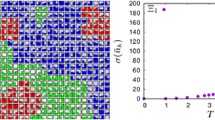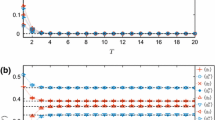Abstract.
A model for opinion formation based on the Theory of Social Impact is presented and studied by means of numerical simulations. Individuals with two states of opinion are impacted due to social interactions with: i) members of the society, ii) a strong leader with a well-defined opinion and iii) the mass media that could either support or compete with the leader. Due to that competition, the average opinion of the social group exhibits phase-transition like behaviour between different states of opinion.
Similar content being viewed by others
References
W. Weidleich, Sociodynamics: A Systematic Approach to Mathematical Modelling in Social Sciences (Taylor & Francis, London, 2002)
D. Stauffer, S. Moss de Oliveira, P.M.C. de Oliveira, J.S. Sa Martins, Biology, Sociology, Geology by Computational Physicists (Elsevier, Amsterdam, 2006)
B. Latané, Am. Psychol. 36, 343 (1981)
J.A. Hołyst., K. Kacperski, F. Schweiter, in “Social Impact Models of Opinion Dynamics”, in Annual Reviews of Computational Physics IX, edited by D. Stauffer (World Scientific, Singapore, 2001), p. 253
Author information
Authors and Affiliations
Rights and permissions
About this article
Cite this article
Bordogna, C., Albano, E. Monte Carlo simulations of a model for opinion formation. Eur. Phys. J. Spec. Top. 143, 237–239 (2007). https://doi.org/10.1140/epjst/e2007-00093-y
Issue Date:
DOI: https://doi.org/10.1140/epjst/e2007-00093-y




